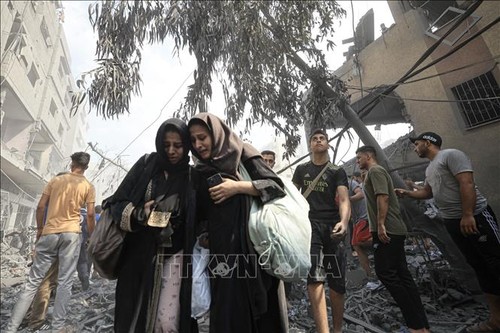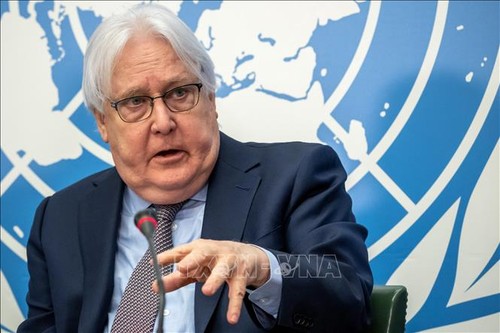 Palestinian people leave their houses in Gaza to flee from the conflict between Hamas and Israel. (photo taken on Oct 9, 2023: AFP/ VNA) Palestinian people leave their houses in Gaza to flee from the conflict between Hamas and Israel. (photo taken on Oct 9, 2023: AFP/ VNA) |
The UN’s Global Humanitarian Outlook for 2024, released on Monday, reported that conflicts, climate emergencies, and the collapse of economies weigh heavily on the most vulnerable people on every continent, causing severe hunger, large-scale migration, and disease outbreaks.
Conflicts spark humanitarian crises
Geopolitical tensions have resulted in conflicts in many regions around the world. According to the UN Office for the Coordination of Humanitarian Affairs, one in five children in the world is living in a conflict zone or has fled a conflict. About 258 million people worldwide are suffering from urgent famine, which means they will die soon unless they receive some relief. One in 73 people in the world has had to leave their home due to a conflict, a natural disaster, or and economic cries, which is twice the number 10 years ago.
The conflict in the Gaza Strip is now drawing the most global attention as the humanitarian situation there is deteriorating rapidly. UN figures released earlier this week showed that 85% of the population in Gaza or 1.6 million Gazan people, have fled their homes to escape the fighting between Hamas and Israel. Around 18,000 civilians, including many children, have been killed, and 50,000 injured. The World Food Program says half of Gaza's population or nearly 1 million people is starving.
Speaking in Geneva, Switzerland, on Tuesday on the 75th anniversary of the Universal Declaration of Human Rights, UN High Commissioner for Human Rights Volker Turk described the situation in Gaza as "on the verge of well beyond breakdown".
Martin Griffiths, UN Deputy Secretary General in charge of humanitarian affairs and emergency relief, said the world's focus should not be exclusively on Gaza because the entire Middle East, Sudan, Afghanistan, and East Africa are also hot spots that need large-scale humanitarian relief. World Food Program representative in Somalia Petroc Wilton called on the international community to spread concern more equitably.
“The grim situation is particularly evident in Somalia, where levels of hunger are reported to be among the worst in a decade,” said by Petroc Wilson, adding that deadly floods have compounded the struggles of those already grappling with food insecurity, following the longest recorded drought in the country's history.
 UN Deputy Secretary General Martin Griffiths (photo: AFP/VNA) UN Deputy Secretary General Martin Griffiths (photo: AFP/VNA) |
Financial difficulties
To handle severe humanitarian challenges, the UN needs major financial support. UN Deputy Secretary General Martin Griffiths said current support from the international community is not sufficient to meet the actual need. This year humanitarian programs have received only 35% of the nearly 57 billion USD needed. Consequently, the UN can only provide relief to 128 million people this year.
Griffiths said that even donor countries are facing difficulties. The UN will be looking for just 46.4 billion USD in 2024, a considerable reduction from the 57 billion USD sought this year, and will focus on helping the 300 million people most in need.
“We will target, for our specific needs for the agencies that I represent, 181 million of those 300 million people. And the difference between the two is not about need, but it is about that there are other organizations, notably the Red Cross and the National Red Cross Societies, the Médecins Sans Frontières and others who go out with their own appeals and their own responses,” said Griffiths.
The Global Humanitarian Overview for 2024 will focus on 72 countries, including 26 crisis countries and 46 neighboring countries that have been affected by the crisis countries. The 5 countries that need the most support include Syria (4.4 billion USD), Ukraine (3.1 billion USD), Afghanistan (3 billion USD), Ethiopia (2.9 billion USD) and Yemen (2.8 billion USD). Next year the Middle East and North Africa will need 13.9 billion USD in aid.
The UN estimates that there will be 300 million people in need next year, 60 million people fewer than this year. There is no doubt about climate change competing with conflict as the driver of need, which will make it harder for UN humanitarian agencies to manage response plans.